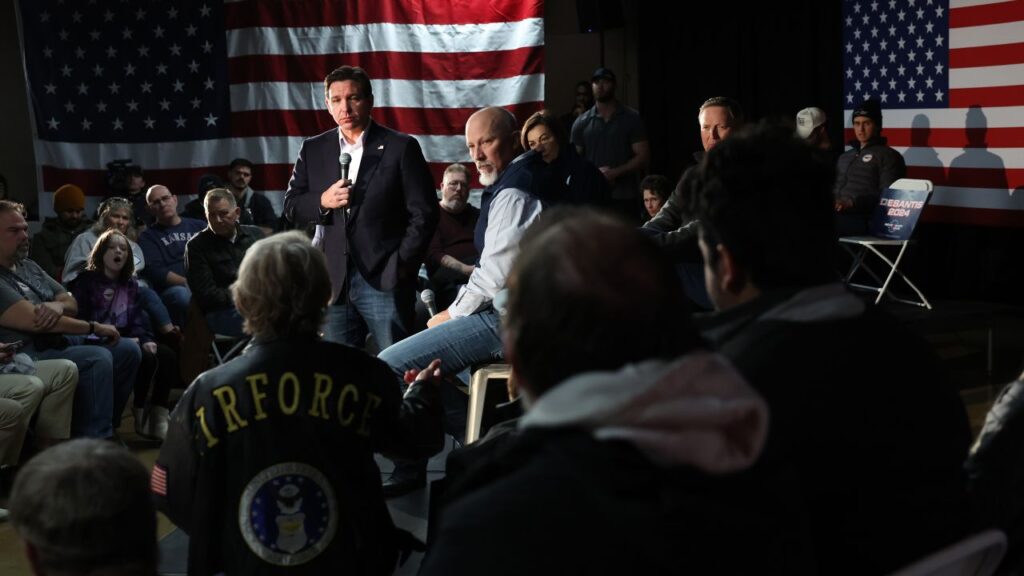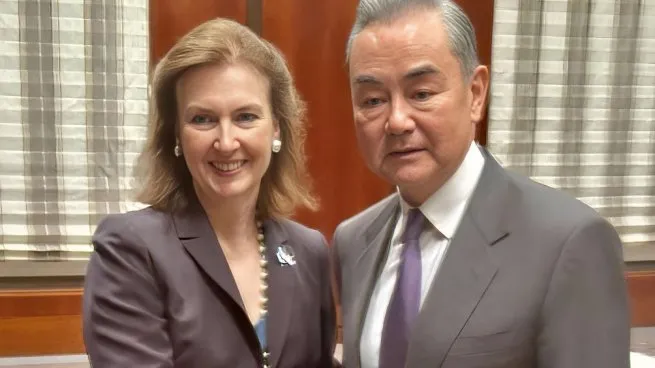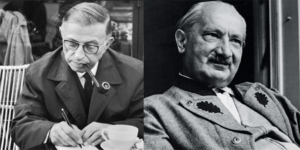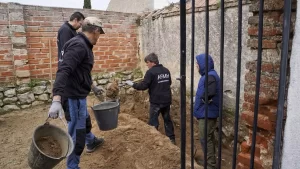Florida Gov. Ron DeSantis warned in a CNN town hall Tuesday night that Republicans are “going to lose” the 2024 election if they nominate former President Donald Trump.
The day after finishing a distant second to Trump – though just ahead of former South Carolina Gov. Nikki Haley – in Iowa’s caucuses, the Florida governor fielded questions in New Hampshire at a town hall moderated by CNN’s Wolf Blitzer.
He used the event to make the case that with a conservative policy record, he would be better able than Haley to consolidate Republican support; and with less personal baggage, he’d be better positioned than Trump to win a general election.
“If Donald Trump is the nominee, the election will revolve around all these legal issues,” DeSantis said.
“We’re going to lose if that’s the decision voters are making based on that. We don’t want it to be a referendum on those issues,” he said. “We want it to be a referendum on the country going in the wrong direction and a candidate like me being a president who could reverse the decline.”
That message was the same one DeSantis has emphasized on the campaign trail in recent weeks. He didn’t launch any new attacks on Haley and Trump but did seek to make clear he remains a factor in the race.
Here are five takeaways from DeSantis’ town hall:
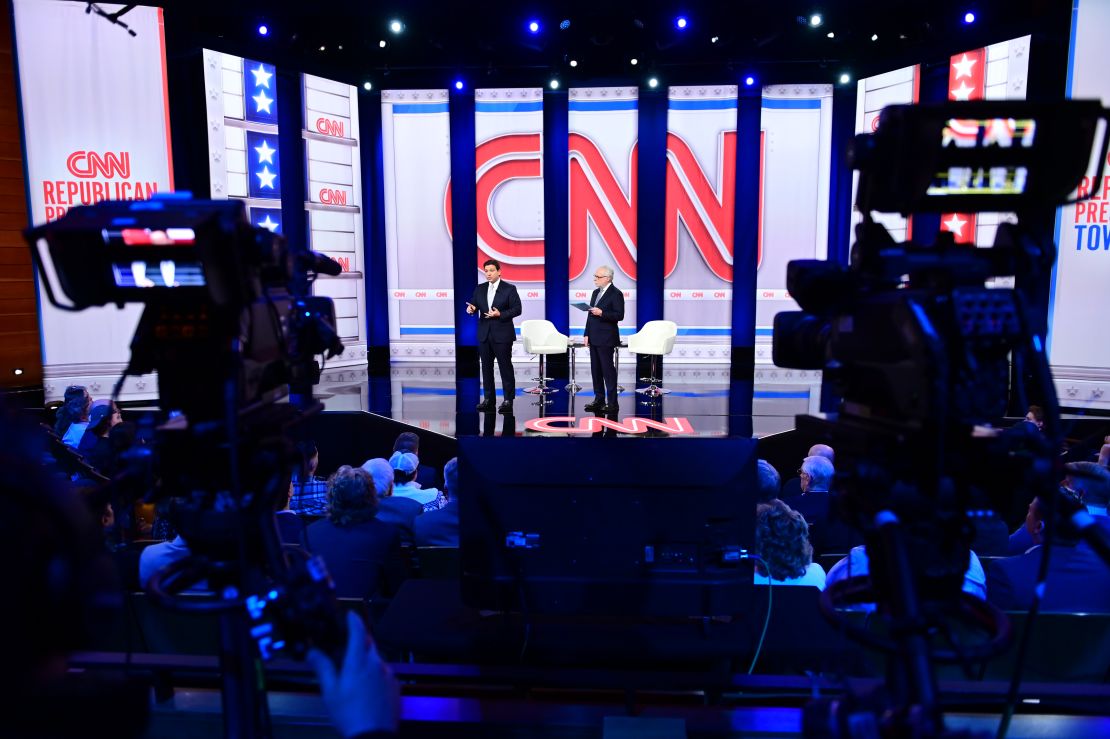
Florida Gov. Ron DeSantis, left, participates in a CNN Republican presidential town hall moderated by Wolf Blitzer, right, at New England College in Henniker, New Hampshire, on January 16, 2024.Will Lanzoni/CNN
DeSantis tries a go-everywhere, do-everything strategy
Trump won’t debate his Republican rivals. And, as of Tuesday morning, Haley says she won’t either, unless the former president shows up. That led ABC News to cancel plans for a Thursday night face-off, and it could spell the end of the 2024 GOP primary debates.
But DeSantis wanted to make sure New Hampshire voters knew it wasn’t his fault — he had been up for it.
“I’m the only candidate that actually agreed to come to New Hampshire to debate,” he said. “I’m the only one who’s not running a basement campaign at this point.”
His comments demonstrated how DeSantis is looking for every possible opportunity to break through.
He visited South Carolina earlier Tuesday before continuing on to New Hampshire. Why? As DeSantis explained it, his team wasn’t sure what the weather would be like in the Granite State, and he didn’t want to waste any time.
He also knocked Haley for failing to compete in the party-run Nevada caucuses, where on February 8, only Trump, DeSantis and little-known Dallas pastor Ryan Binkley are on the ballot. (Haley is competing in the state-run primary, but delegates to the national GOP convention will be awarded based on the caucus results.)
Voter asks DeSantis about past Trump endorsements. Hear his response
01:44 – Source: CNN
“I’m competing for delegates. And yes, the party went to a caucus to try to rig it for Trump,” he said, referring to the Nevada Republican Party’s decision to run its own caucuses. “But you know, as Republicans, it’s not always going to be fair for us.”
There is some irony in DeSantis’ go-everywhere, do-everything strategy. He began his campaign largely ignoring and sidestepping mainstream media. That’s changed now that the Florida governor has little to lose — unlike Trump, who won the Iowa caucuses by a record-setting margin, and Haley, who polls suggest is battling Trump for first place in New Hampshire with DeSantis in a distant third.
But his performances have demonstrated how comfortable a once-shaky DeSantis has grown with formats such as televised town halls.
“You deserve, as a voter, to have the candidates come up, answer your questions in forums like this, have somebody like Wolf (Blitzer) moderate a debate where you go back and forth,” he said Tuesday night.
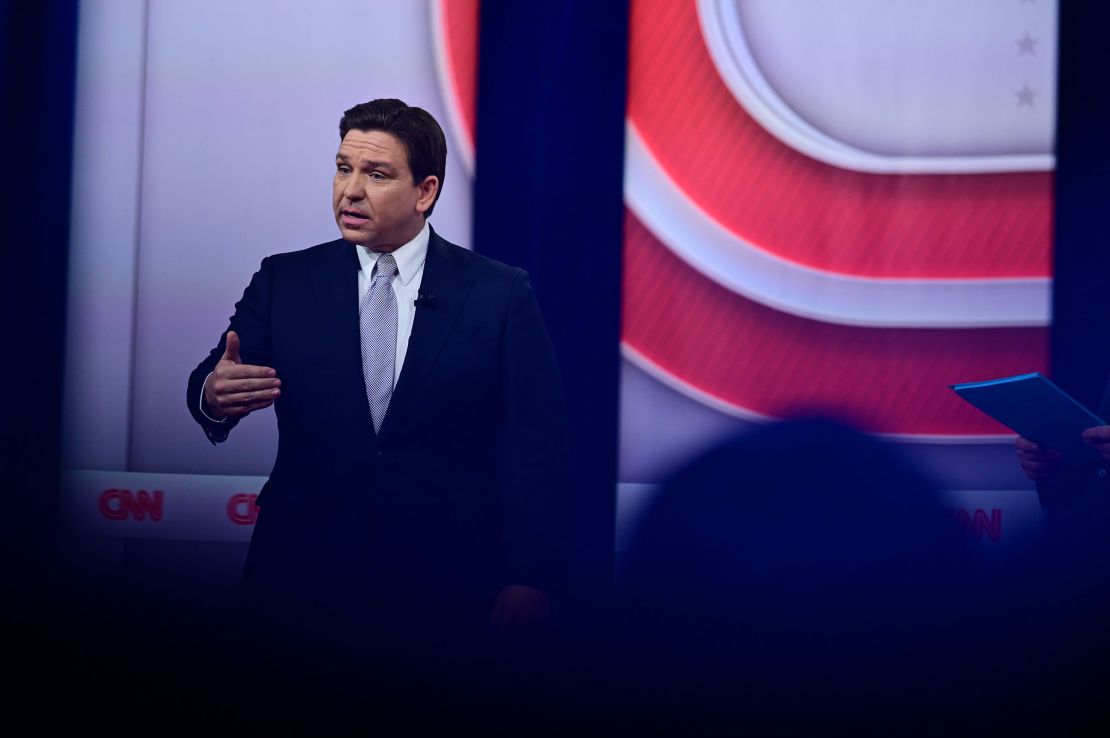
DeSantis answers a question during the town hall in New Hampshire on January 16, 2024.Will Lanzoni/CNN
DeSantis questions Haley’s ability to unite Republicans
DeSantis offered a simple message about Haley: She cannot unite the GOP and win the nomination.
Within that soundbite, though, was some insight into how he views the next stage of this race. It’s a clear appeal to the Never Trump voters who could decide the New Hampshire primary. DeSantis is, in effect, saying that if you do not want to nominate Trump, then he’s the guy people should support.
He also jabbed Haley for refusing to take part in any future debates, lumping her in with President Joe Biden and Trump as candidates running from their “basements.”
DeSantis acknowledged the need to make a wider political appeal – itself a departure from his earlier campaign strategy – and talked up his election record in Florida, where his victories have come with some support from Democrats.
“I think it’s great in a general election to build a big tent,” DeSantis said, “but to win a Republican primary … you gotta be able to win core Republicans, you gotta be able to win conservatives, and she can’t do that.”
He tried to underline the point by saying that a number of Trump supporters in Iowa had told him that they liked him and would have backed him if the former president hadn’t also been on the ballot.
Haley, he insisted, is not a realistic second choice for Trump voters.
“She does not have the ability to win the kind of coalition that you need to win a Republican primary – period, much less take on Donald Trump,” DeSantis said.
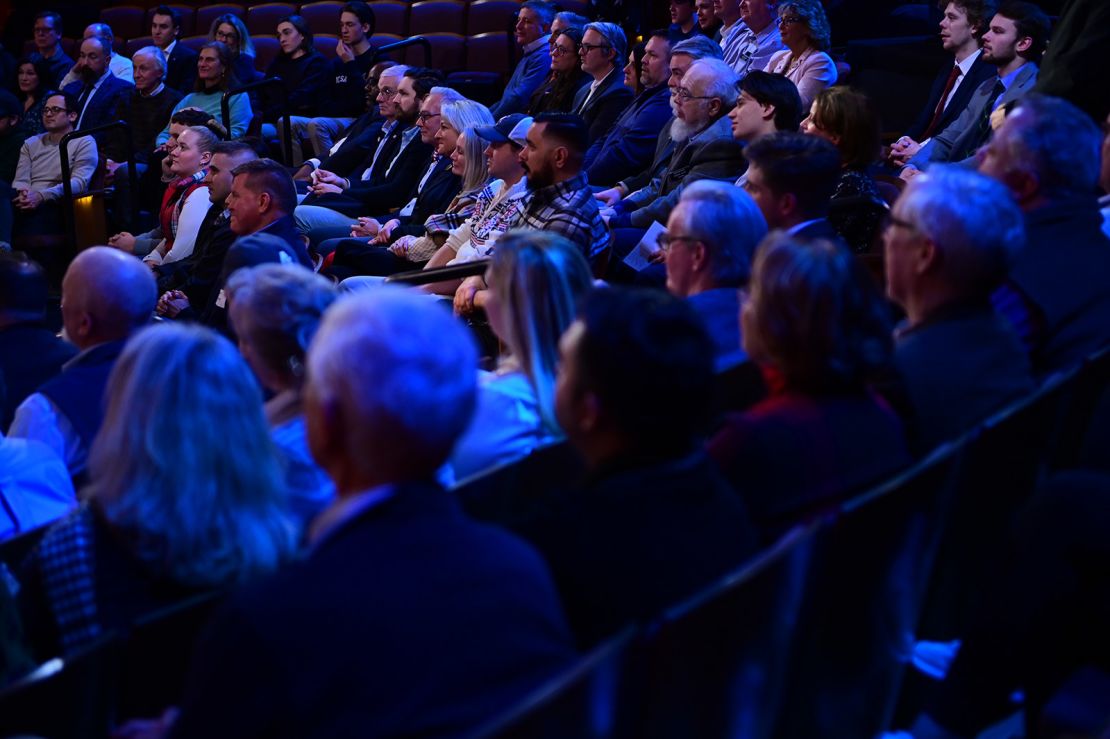
The town hall was held at New England College in Henniker, New Hampshire.Will Lanzoni/CNN
‘The US is not a racist country’
DeSantis was asked if he agreed with comments Haley had made earlier in the day, when she said that the United States has “never been a racist country.”
“The US is not a racist country,” the Florida governor said, while noting that “we’ve overcome things in our history.”
DeSantis made fighting “woke-ism,” including education around race, a core part of his early national profile. He faced waves of criticism over Florida’s efforts to limit teaching about racism in schools, from his pushback against the College Board over its Advanced Placement course on African American studies to how the state’s curriculum teaches about slavery.
DeSantis said Tuesday night that, in his view, the Republican Party stands for “merit and achievement and colorblindness,” and highlighted his efforts to eliminate diversity, equity and inclusion programs in Florida. In May last year, he signed legislation to defund DEI programs at Florida public schools.
“They say it’s diversity, equity and inclusion, but it’s really very ideological, and they’re trying to impose an agenda,” he said. “I think the way it’s actually practiced, it stands for discrimination, exclusion and indoctrination, and it’s wrong.”
Asked to clarify if he thought the US had ever been a racist country, DeSantis said the country has had “challenges with how we’ve dealt with race.” He pointed to the Supreme Court’s infamous 1857 Dred Scott decision – in which the justices ruled that Black Americans could not be US citizens. The ruling was later nullified by the 14th Amendment.
Haley was asked during a Fox News appearance Tuesday if she thought her party was racist after MSNBC’s Joy Reid questioned whether she, as a woman of color, could win the GOP nomination. Haley, the daughter of Indian immigrants, referenced the country as a whole in her answer.
“We’ve never been a racist country,” she said. “Our goal is to make sure that today is better than yesterday. Are we perfect? No. But our goal is to always make sure we try and be more perfect every day that we can.”
DeSantis warns of Trump’s legal liabilities
DeSantis continued his warnings that Trump’s legal issues will follow him throughout the campaign.
“If Donald Trump is the nominee, the election will revolve around all these legal issues, his trials, perhaps convictions if he goes to trials and loses there and about things like January 6,” DeSantis said. “We’re going to lose if voters are making a decision based on that. We don’t want it to be a referendum on those issues. We want it to be a referendum on the country going in the wrong direction and a candidate like me being a president that can reverse the decline.”
Still, it’s notable that just a day after Trump’s resounding victory in the Iowa caucuses, DeSantis devoted less than a total of five minutes to discussing the former president by name.
He mentioned Trump’s lack of participation in the primary debates, acknowledged how his support
for the former president from his days as a congressman changed over time and hit Trump over Covid-19.
But overall, DeSantis clearly refrained from devoting too much of this town hall to the GOP front-runner.
DeSantis loosens up
DeSantis sought to connect with town hall attendees in more personal ways Tuesday night.
He talked about growing up in the 1990s and playing baseball — “It was like a holiday from history” that changed on September 11, 2001, he said.
He asked a woman who posed a question about mental health if she had any advice.
The looser, gentler DeSantis onstage in New Hampshire looked like a much different candidate than the one who entered the presidential race with a reputation as a brawler in Florida.
“I don’t take the politics personally. People attack me — that’s just the price of doing business,” he said.
That comment would’ve raised eyebrows back home in Florida when DeSantis was embroiled in a fight with Disney and revoked the company’s decades-old self-governance privileges around its Orlando-area theme parks after it criticized a state law banning certain classroom instruction related to sexual orientation and gender identity.
Though it might be too little, too late, DeSantis has in recent months altered what started as a pugnacious approach and culture war-focused message. On Tuesday night, he stressed the nation’s need to “be able to have disagreements.”
This story has been updated with additional information.
Fuente: CNN
